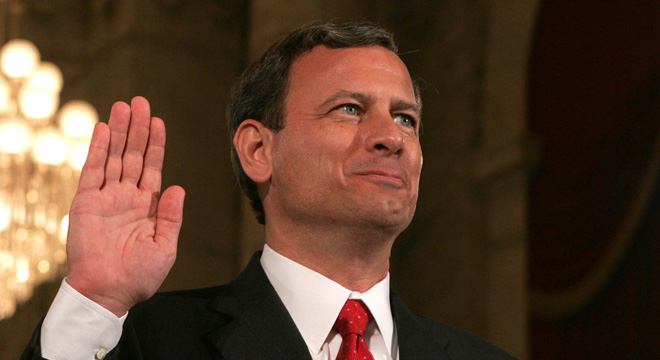You’re the chief justice of the United States, and you’re presented with a choice: Either rebuke the political movement that gave you your dream job, or put your institution’s reputation on the line by neutering a sitting president’s signature legislation for the first time in 75 years.
This is the unenviable dilemma John Roberts faces as the Supreme Court prepares to rule on “Obamacare.” Initial votes were cast by the justices last Friday, and a final decision on the law’s constitutionality is expected by the end of June. And with four liberal justices considered a lock to uphold the law, Roberts is uniquely positioned to determine the law’s fate, and faces considerable risks no matter what he chooses.
“I see this as his legacy,” Lucas A. Powe Jr., a Supreme Court historian and professor of law at the University of Texas, Austin, told TPM. “This is really going to be a defining moment about whether he views himself as a member of a political coalition that is in power to impose its will on its country, or if he’s at least somebody that can rise above partisan politics.”
One school of thought is that Roberts will come down on the same side as Justice Anthony Kennedy, and end up writing either a 6-3 majority decision to uphold the law or a 5-4 opinion against it. Another, fueled by his line of questioning last week, is that the conservative Bush appointee isn’t sold on the individual mandate and will vote to overturn it.
A third view is that Roberts may be the fifth vote to uphold the law, due to the 2010 U.S. v. Comstock case, when he became the only conservative to sign on to a majority opinion with the four liberals in favor of sweeping federal power. Kennedy and Justice Samuel Alito wrote separate concurring opinions outlining narrower visions of the power in question.
More often than not, though, Roberts sides with the court’s conservative wing. And the Comstock comparison suffers from a key limitation: its political significance is dwarfed by health care case’s. In many ways that defines Roberts’ dilemma: He’s facing far more political pressure from the right to overturn the mandate; but this time around the court’s reputation is on the line, which may make Roberts more wary of breaking with precedent.
“A lot of people really believe that the Supreme Court is a super-legislature that decides things on political rather than legal grounds,” said Timothy S. Jost, a professor of law at Washington and Lee University, citing Bush v. Gore and Citizen United. “This would be an opportunity for the chief justice to say, ‘No, we’re going to defer to Congress on major issues and only strike down laws that are clearly unconstitutional.'”
Powe added, “If this had been the signature item of the last two years of George W. Bush’s administration, Roberts would uphold it. There is no doubt.”
But there is a dissenting view. Roberts may have some cover from public opinion, if not from history’s ultimate judgment. “I doubt the chief justice is worried that striking down the mandate will undermine the court’s legitimacy,” said Brian Fitzpatrick, a professor at Vanderbilt University School of Law and former clerk to Justice Antonin Scalia. “The polling seems to suggest that two-thirds of the country is opposed to the mandate. That is a very safe place for the majority to be.”
The last time the Supreme Court axed a president’s major law was in the 1930s, when it struck key pillars of the New Deal. In response, President Franklin Roosevelt mounted a fierce public relations campaign against the court and, after he won re-election, compelled the court to reverse course. Historians note that the episode tarnished the high court’s reputation.
Following a major campaign speech Tuesday, President Obama not-so-subtly warned the court to “exercise its jurisprudence carefully,” arguing that judicial precedent in his favor dates back even before the New Deal.
“We have not seen the court overturn a law that was passed by Congress on an economic issue like health care — that I think most people would clearly consider commerce — at least since Lochner,” Obama said, referring to an early 1900s era when the Supreme Court axed minimum wage and child-labor laws. “The burden is on those who would overturn a law like this.”
For Roberts, an escape hatch of sorts opens up if Kennedy decides to uphold the law, in which case he won’t be seen as the deciding vote. But there’s no ducking accountability for his decision either way. If he votes to uphold the law, conservatives may never forgive him. But if he strikes it down, Jost argued, “history will look upon him as a judge who looked at politics rather than law.”






